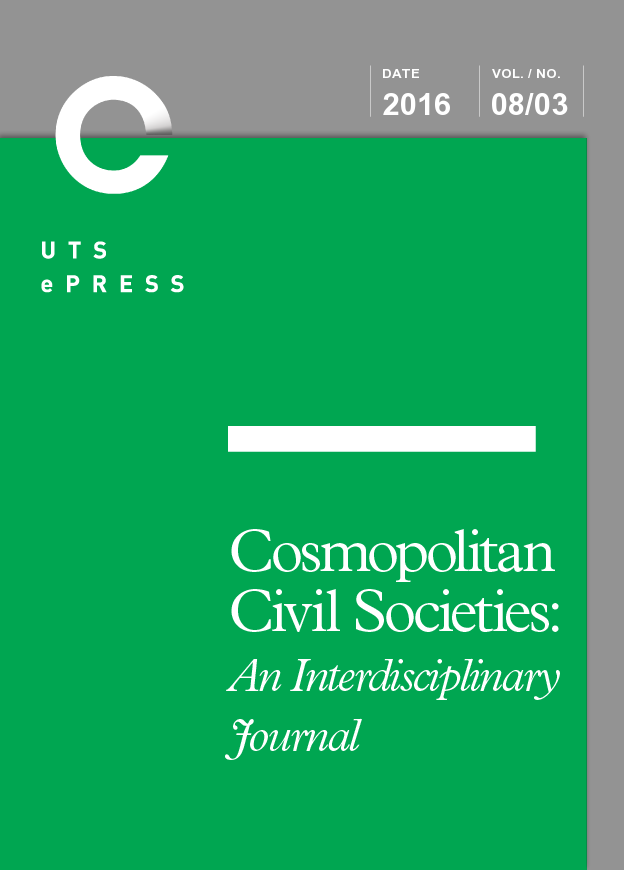ETHNOCRACY: Exploring and Extending the Concept
Main Article Content
Abstract
Ethnocracy means ‘government or rule by a particular ethnic group’ or ethnos, specified by language, religion, ‘race’ and/or other components . It has been developed from a general imprecise label into an analytical concept sometimes contrasted with democracy or rule by the demos, the people in general. Primarily it was developed as national ethnocracy for regimes in contemporary national states which claim to be ‘democratic’, and it was mainy pioneered by the Israeli geographer Oren Yiftachel to analyse ethnically-biased policies and the asymmetrical power relations of Israeli Jews and Palestinians. However, it can be extended to several other contexts each of which has its own particular dynamics. Yiftachel himself extended it ‘down’ to city level and specifically urban ethnocracy; and we can further explore how cities and city government can moderate state ethnocracy. But going beyond the national and the urban, and the particularities of the Israeli case, the concept can be enriched in other ways, and I suggest three further extensions: firstly, ‘back’ to imperial ethnocracy which often preceded and gave birth to national ethnocracy; secondly, and more speculatively, it can be extended ‘forwards’ to the (usually mis-named) ‘post-conflict’ or power-sharing stages of ‘peace processes’, to what we might call shared or ‘post-conflict’ ethnocracy; and thirdly, it can perhaps be extended to contemporary religious-political conflicts which are at least partly transnational in character, to what could be called religious or ‘post-national’ ethnocracy. The five variants of ethnocracy and their varied inter-relations can help tie together different features of ethno-national conflicts. However questions remain: about, for instance, the variable and relative importance of ethnicity’s different components; about where to draw the boundary between ethnocracy and democracy; and about possibly rival concepts such as ‘ethnic democracy’ on one side and ‘apartheid’ on the other.
Keywords: national, urban, imperial, ‘post-conflict’ and ‘post-national’ ethnocracies; democracy; majoritarianismArticle Details
Issue
Section
Authors who submit articles to this journal from 31st March 2014 for publication, agree to the following terms:
a) Authors retain copyright and grant the journal right of first publication with the work simultaneously licensed under a Creative Commons Attribution License that allows others to share and adapt the work with an acknowledgement of the work's authorship and initial publication in this journal.
b) Authors are able to enter into separate, additional contractual arrangements for the non-exclusive distribution of the journal's published version of the work (e.g., post it to an institutional repository or publish it in a book), with an acknowledgement of its initial publication in this journal.
c) Authors are permitted and encouraged to post their work online (e.g., in institutional repositories or on their website) prior to and during the submission process, as it can lead to productive exchanges, as well as earlier and greater citation of published work (See The Open Access Citation Advantage Service). Where authors include such a work in an institutional repository or on their website (ie. a copy of a work which has been published in a UTS ePRESS journal, or a pre-print or post-print version of that work), we request that they include a statement that acknowledges the UTS ePRESS publication including the name of the journal, the volume number and a web-link to the journal item.
d) Authors should be aware that the Creative Commons Attribution (CC-BY) License permits readers to share (copy and redistribute the work in any medium or format) and adapt (remix, transform, and build upon the work) for any purpose, even commercially, provided they also give appropriate credit to the work, provide a link to the license, and indicate if changes were made. They may do these things in any reasonable manner, but not in any way that suggests you or your publisher endorses their use.
For Volume 5 No 3 (2013) and before, the following copyright applied:
Authors submitting articles to UTSePress publications agree to assign a limited license to UTSePress if and when the manuscript is accepted for publication. This license allows UTSePress to publish a manuscript in a given issue. Articles published by UTSePress are protected by copyright which is retained by the authors who assert their moral rights. Authors control translation and reproduction rights to their works published by UTSePress. UTSePress publications are copyright and all rights are reserved worldwide. Downloads of specific portions of them are permitted for personal use only, not for commercial use or resale. Permissions to reprint or use any materials should be directed to UTSePress.
